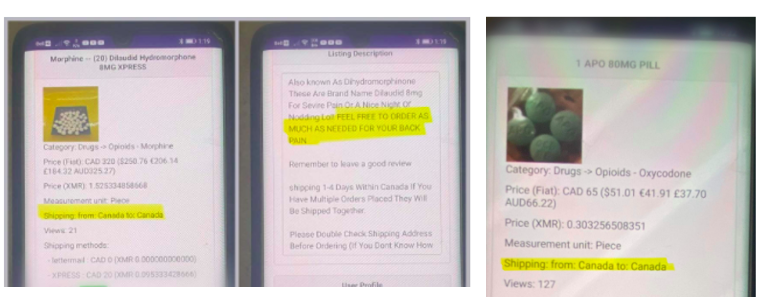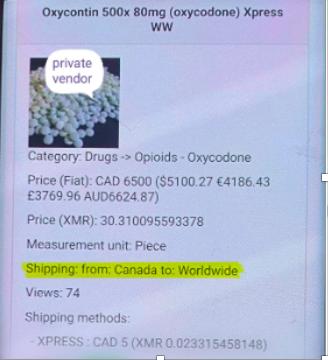To update a very old adage: "The Pain is Always Less Painful on the Other Side of the Border."
Same old, same old, but worse
It's been (almost) one decade that I have been writing about the catastrophic consequences of the misguided (1) regulations and laws "designed" to address the so-called "opioid epidemic," and it's fair to say that there has been no progress during that time. Quite the opposite, really. Just about everything has gone from bad to worse for pain patients (as well as drug abusers) since the geniuses from PROP (1) and the CDC declared war on opioid prescriptions in the early 2010s. This should be more than obvious by now to anyone who is paying attention, especially since it has been conclusively shown that there is no relationship between opioid prescriptions and overdose deaths from the drugs (2). And things are no better to our north.
Pick your poison
When something goes "wrong" in the US (for example, a presidential election that people are upset about), it's almost comical how fast the "I'm moving to Canada" cliche starts flying around. But if you're a pain patient in the US, you might want to hold off on calling Air Canada. It's hard to tell whether things are "worse" there, but they sure don't seem to be any better, something made clear in a new press release from the Chronic Pain Association of Canada (CPAC). More on that later.
Name change?
As you will soon see, Canadians in pain have their own set of problems, so crossing the border isn't going to help, making me think about a fine organization: Doctors Without Borders...
...and since it's increasingly difficult (sometimes impossible) to find a physician to write opioid prescriptions in either country, doesn't Borders Without Doctors sound catchy?
Oh (My) Canada!
Even I was shocked to read CPAC press release. Here are some lowlights:
- A recent study conducted by the University of British Columbia confirms everything that CPAC and ACSH have been saying for years:
“Our current analysis suggests that these modest (3) changes in prescription opioid utilization did not translate into reductions in opioid overdose hospital admissions, all-cause emergency department visits, opioid overdose mortality or all-cause mortality and were not associated with sustained reductions in all-cause hospital admissions."
- The response by CPAC could have been written at ACSH or the other way around.
"[The authors] note that concern has been raised over patients, after being forcibly tapered, are turning to the street – desperate for pain relief."
What's a patient to do?
Buying pain meds on the street and hoping that you're not getting a counterfeit pill spiked with illicit heroin is not a long-term strategy I would recommend. So Canadians have been trying something different – buying them on the "Dark Web" from... who knows? Are they better or worse? If quality can be measured by price, then they're pretty good. Street prices of oxycodone and hydrocodone now range from $3-$20 per pill. That seems like a screaming bargain compared to what Canadians are paying online (4). 
Photos: CPAC
(These phone images are impossible to read, so I've included a "translation.")
(Left) Dilaudid (mistakenly called morphine), Shipping from Canada to Canada. 20 Pills for 320 USD (plus shipping). (Middle) "FEEL FREE TO ORDER AS MUCH AS NEEDED FOR YOUR BACK PAIN" (Right) One 80 mg OxyContin pill for 51 USD.
The screenshots above were found in two minutes by a CPAC volunteer. This is what medicine has come to?
So this is life in Canada. Doesn't sound all that different from life in the US. Especially when you read what CPAC's Executive Director Barry Ulmer has to say, it should be disturbingly familiar-sounding:
What the flawed opioid prescribing guideline has done is to allow doctors to force their patients to lower and lower doses of opiate medicines. This destabilized what were otherwise medically managed patients. Doctors have been doing this from fears of being investigated and sanctioned by their provincial regulatory bodies and losing their licenses. Doctors have openly admitted this to patients.
NOTES
(1) PROP stands for Physicians for Responsible Opioid Prescribing, where the beloved Andrew Kolodny, the founder and executive director, began to get his claws into your doctor-patient relationship.
(2) See Red Lawhern's ACSH article. It proves this. And then some.
(3) Canada's "modest" reduction in opioid prescribing doesn't hold true in the US. We have cut prescribing by 40%. And see the same disaster they saw in Canada.




